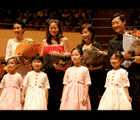 |

First World Chinese Youth Forum
The
long-awaited First World Chinese Youth Forum, co-organized
by the Federation and the All-China Youth Federation,
is scheduled for late September. The programme has met
with very encouraging response from delegates, guest
speakers and the Chinese community at large. We are very
grateful to our official carrier, Dragonair, who have
generously offered sponsorship in the form of discount
air tickets for participants. We must also thank the
Beijing China Study Public Management Consulting
Co. Ltd and The Dragon Foundation for their valued sponsorship
of the event. The Forum will bring together 1500 young
delegates from Hong Kong, Macau, Taiwan, Mainland China
and overseas. They will gather at the Great Hall of the
People in Beijing to discuss issues relating to the theme
“New Opportunities in a Global Economy” led by renowned
guest speakers. The meeting aims to nurture leadership
potential and encourage mutual exchange by encouraging
networking among youth of common ethnic Chinese origin.
|
 |
|

Lecture Series on TV
The
Federation and the University of Hong Kong co-organized
the “Leaders to Leaders” Lecture Series
in 2004. It comprised lectures by twelve well known Hong
Kong figures such as Sir TL Yang who spoke on morality,
Dr Eden Woon who lectured on successful enterprise and
Dr Rosanna Wong who discussed giving back to society. The
speakers shared their wide experience of their selected
themes with the participants and such was the acclaim for
the series that the Television Division of RTHK has produced
an 8-part TV series from footage shot during the lectures.
Broadcasting began on 13th September on ATV World and continues
on Monday afternoons 12:30-1:00pm with repeat showings
at 1:00p.m on the same channel on Wednesdays and Fridays.
Given its warm reception the Federation plans to organize
another similar series in 2005 beginning in February.
Click
here for a full list of the 2004 speakers…
|
 |
|

Night out at Youth Charity Concert
Without the generous help of such sponsors
as the Hang Seng Bank, the Hong Kong Airport Authority,
Gold Peak Industries (Holdings) Ltd, and the Yuen
Yuen Institute, the Youth Charity Concert could not have been
such a success. Their donations came at a crucial time
for the future development of services for youth. The uplifting
performances of cellist, Trey Lee; violinist, Elita Kang;
pianist, Nancy Loo and vocalist, Karen Mok gave great pleasure
to a virtually full house. Trey Lee treated the audience
to a delightful selection of pieces including works by
Beethoven (Variations on See the Conquering Hero Comes)
Faure (Berceuse) and a Finnish song called Taysikuu (Full
Moon), which was sung by Karen Mok. Click here to see a
list of all our kind sponsors to whom we owe thanks.
|
|
|
 |

How well do
Hong Kong youth cope with stress? Stress is normal here, as
it is everywhere, but according to a recent Federation
survey less than 30% have problems learning how to deal
with it. Half of those interviewed said they talk out their problems
with peers and parents rather than seek professional help
although
nearly 60% admitted that they were unaware of the support
services available. Cooperative
support, already available at family, school and community level
needs to be coordinated to give it a higher profile.
|
 |
|
Dr.
Rosanna
Wong, DBE, JP
|
|
| This
is where government departments can step in, working with social
services groups and following overseas experience in structuring
a supportive environment for youth under severe pressure. That
way the minority who need professional care will know they are
not alone.
*Youth Study Series. How Hong Kong young people cope with stress. Hong Kong Federation
of Youth Groups, September 2004.

|

May: a life back from the brink
Many young people feel down in the dumps from time to time, depressed
and sad about confusing events in their lives, rebelling against
parental control and plagued by the stress of conflicting emotional
needs. These are fleeting problems for most but a small percentage
suffer far more deeply. Their sense of worthlessness and discouragement
may be caused by failure at school or by a distressing home life.
They need help before their thoughts turn suddenly to drug abuse,
criminal behaviour or suicide…
The Federation has school social workers in the field who work
as counsellors, looking out for such youngsters, ideally catching
them before they fall, providing care and follow up after a crisis
and offering the two things they need most - understanding and
compassion. Chan-ki is one such experienced, dedicated counsellor.
She talked about working with May, a teenager who grew up with
a physically abusive father and a mother whose support was tenuous
at best. May trusted nobody by the time she met Chan-ki. In fact
she spent half her time as a school dropout, feeling totally isolated.
Chan-ki May was in Form
4 when I first saw her. She’d developed symptoms of clinical
depression after traumatic experiences at
home. Her father gambled and became physically violent with her.
The result was a very negative self-image. She started dropping
out from class, suffering from delusions and imagined threats from
her peers. She even carried a knife at school but was also threatening
suicide. Her teacher referred her to a doctor, then a psychiatrist
and psychological counsellor. Between them they worked out a special
schedule to try to re-integrate May gradually into normal life
at school and at home.
HKFYG Did you liaise with her schoolmates as well as her teachers?
Chan-ki Yes, I trained
what we call an “angel” helper for her, a classmate who learned
some of the simpler skills for dealing
with depressives - how to deflect some of May’s most negative
tendencies but also to know when not to argue with her. Her teachers
needed
advice too. They are crucial figures for a person like May and
have to learn how to tread the thin line between being too kind
and too authoritarian. I also had to teach her mother, who felt
very guilty, how to talk to her and transfer guilt feelings into
positive kindly activity.
HKFYG What form of therapy did May herself need?
Chan-ki She was on medication
for a long time though she didn’t like it. Four or five times
she called me, threatening to commit
suicide but I managed to talk her through and get hold of the police
who helped to prevent her. Twice she was hospitalized but in the
long run she realized that she wanted to be normal and nobody but
her could achieve that. She learned to trust me and to internalize
strategies for coping long-term with her depression. Now she goes
out every day without fear and I would like to think she is over
the worst. I think of her as one of my successes but you can never
be sure with someone like May. They could slip into depression
again so very easily…
The Federation’s work
continues and with counsellors like Chan-ki we will be able to
concentrate increasingly on establishing early
contact with students.
“I want to talk to them on the very first day of school”, said
Chan-ki. “Once they know there is somebody close at hand they
can turn to when they feel down it can make the difference between
the occasional bout of the blues and contemplating suicide.”
|
|
 |
 |
|
| Teenage sex
The Department of Community
and Family Medicine at the Chinese University of Hong Kong recently
released the results of a 1999
survey* on young Hong Kongers’ sex attitudes. 8,382 students aged
15-18 from 48 Hong Kong schools were interviewed. Only 5% reported
they had been sexually active and nearly 17% of them – mostly
boys - had been forced into it. The report shows a high correlation
between sexually active females and attempted suicide. Both girls
and boys in the group reported physical and psychological health
problems and many had seen a doctor in the month before the survey.
Males complained mostly of migraine or nervous disorders while
females suffered largely from respiratory complaints. Emotional
problems among sexually active teenagers are common worldwide but
sex is a taboo subject for most Chinese adolescents. Effective
sex education with better coordination among all relevant service
units is clearly a top priority in Hong Kong.
*Aids Patient Care and STDs (2004) 18 (8), 470-480
|

|
 |
|
|
Private tuition
makes reading worse
Researchers
at the University of Hong Kong’s Faculty of Education interviewed
4,300 Primary
4 students at 66 Hong Kong primary schools.
They found that reading ability among the 43% who took private
tuition after school was worse than that of counterparts who had
no private classes. The researchers conclude that this is because
tuition schools focus on homework and rote learning. They also
say that students’ reading abilities could be improved if private
tutors used story-telling which introduces much more vocabulary
with wider-ranging content than textbooks. It also improves children’s
comprehension skills. The
photo shows a creativity class at a Youth SPOT where the opposite
of rote learning takes place...
|
 |
| |
|
|
|
|
| |
|
|

